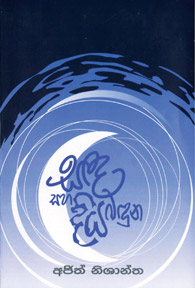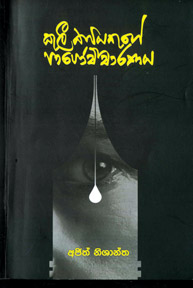Two poetry collections
 Ajith Nishantha is a Sinhala poet who has read quite a lot of English
poetry. Some of them he has tried to translated into English for his own
inspiration. He has written his own Sinhala poems on his own thoughts,
experiences and observations. Ajith Nishantha is a Sinhala poet who has read quite a lot of English
poetry. Some of them he has tried to translated into English for his own
inspiration. He has written his own Sinhala poems on his own thoughts,
experiences and observations.
The collection of translated poems is titled as Sanda Saha Diya
Banduna (Moon and the Urn of Water, 2011) as an author publication. The
original poems are collected as Kulikaviyakuge Papochcharanaya (The
Confessions of a Hired Poet).
Wider gamut
Nishanta has gathered much experience as a contributor to various
Sinhala newspapers and periodicals where poetry pages abound. He thanks
his well wishers who helped him to be known to a wider gamut of readers
through these pages. I found these pages provide a platform to express
poetic skills in manifold ways, some with metrical poems and some others
with free verses.
His first poem looks like a preface to his collection where he
mentions he had got poetic inspiration through this expressive outlook
via poetry pages. He uses the term ‘kavisita’ (poetic mind) as his
source of inspiration. While reading through pages of these two
collections, I had a feeling that Nishanta is a poet with a rare skill
in perceiving some sensitive areas of life though they look common in
the actual nature of their occurrences.
 The title poem revolves round the life of a poet who is being hired
to get the creative activities done for the benefit of the stakeholders
with whom he works day in day out. He does not see the inner sufferings
of the sensitivity of the creativity. The hired poet becomes a slave of
his masters. The title poem revolves round the life of a poet who is being hired
to get the creative activities done for the benefit of the stakeholders
with whom he works day in day out. He does not see the inner sufferings
of the sensitivity of the creativity. The hired poet becomes a slave of
his masters.
This suffering itself is a sort of clamour for mental liberation on
the part of a sensitive poet, who so desires to express himself in the
most fitting manner. This may not be agreeable on the part of those who
employed him. But his chances of liberation are remote. In this
direction the poetic persona is made to express his frustration in the
exploitative world of commercialism.
The poem titled as Viyapath Bogasa (Old Bo Tree) is a sensitive
observation about a sacred tree that needs veneration, though grown in
the busy urban area where nobody has the time to take care of it. It
just grows and becomes older and older neglected. But yet it is a sacred
tree. Several minor poems centre round the aspects of love and
separation. Most of them are quite short and look like graffiti. They
look more like random jottings in a journal where the poet takes out
from time to time.
Mini poems
Then come mini poems on domestic matters such as filial duties of a
wife and admiration of activities on the part of the children. One good
example is titled as ‘Podi Putuge Balirupa’ (Rough drawings of the small
son), where the poet expresses his inner bliss on seeing the drawings of
a child using his father’s papers and pens lavishly and freely.
The father is silent and feels that the only way is to allow the
freedom of expression. The poem titled ‘Sadaya’ (Party) revolves round
the mannerisms of human behaviour on the part of adults in a party where
they dance and drink to the fullest and act like a pack of idiotic
misfits.
The concept of transience is sensitively captured in two poems titled
‘Tavula’ and ‘Avalassana Abisaruliya’.
The extension of the same feeling is shown in poems like ‘Kantoruva’
and ‘Vassanaya’ where the poet sees how things in day to day life change
due to the actions of humans without their knowledge and control.
‘Varada’ is a rare specimen on the subject of genes written in a poetic
form. ‘Sandagamana’ shows how the poet is disillusioned about his
romantic notions on moon and splendor he was taught as a child. This
notion of disillusionment makes him feels that he has not seen the real
moon.
His collection of translated poems include works of contemporary as
well as past poetic works which include poets like Thomas Hardy,
Sarojini Naidu, Rabindranath Tagore and Bertolt Brecht followed by those
poets of the region inclusive of works of poets drawn from languages
such as Hindi, Gujarati, Tamil, Chinese, Japanese and various other
languages. Presumably they are translated from English Translations
anthologized from time to time down history.
Poetic works
It is good to see such poems appearing in one collection especially
as the reader perhaps not so familiar with these poetic works. It is
said that the translated works move faster than the originals and they
are received warmly as companions from far and near. In this direction
Nishanta has to be commended for his effort.
But one point remains to be said.
 Even noted by the translator of Greek poems to English Robert Graves,
what is lost in the translation process is poetry. This is a point that
has to be remembered as last poem comes in two languages, The impact
made in the very first instance is lost up to a certain degree in the
final effort. Even noted by the translator of Greek poems to English Robert Graves,
what is lost in the translation process is poetry. This is a point that
has to be remembered as last poem comes in two languages, The impact
made in the very first instance is lost up to a certain degree in the
final effort.
This does not go to say that the translation of poems from one
language to another is not needed and anticipated, instead it challenges
the very effort at translations.
The translator of poems from one language to another too has his/her
poetic license in a broader sense. But herein the translation method
adhering to a sensitive study of the cultural background of the original
work is emphasized. The poems translated from Naidu, Tagore and Brecht
in the collection of Nishanta are good examples where the flavour of the
original is not lost The translator Nishanta has taken extra care to
present the biographies of the original poets as briefly as possible.
This enables the reader to obtain more information via other sources,
and to further the aspects of the particular creators.
In his preface to the two collection the original and the translated
works, Nishantha notes these works of his have seeped into the book
scenes, a result of his search for further findings in the area of
foreign and local creative works.
The effort has not gone waste for the two faces of Ajith Nishanta’s
creative process are visible.
[email protected]
|



